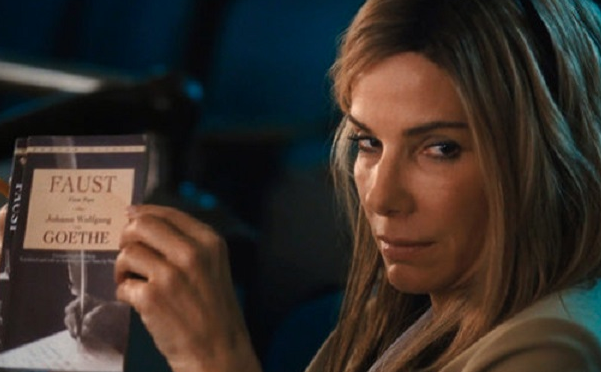When Our Brand Is Crisis first came out, it seemed as though it would hold the same promise for Sandra Bullock as The Blind Side. Both films offer drama, a bit of cheesiness and an underdog. But somehow, David Gordon Green’s remake of the 2005 documentary of the same name didn’t seem to grab audiences in quite the same way. Adapted by screenwriter Peter Straughan (no stranger to revamping material for the screen–he also wrote How To Lose Friends & Alienate People and Tinker Tailor Soldier Spy), Our Brand Is Crisis relies heavily on the anti-heroine concept.
“Calamity” Jane Bodine (Bullock) has been in retirement for several years after failing four times in a row to bring her campaign candidate to a win. Sequestered in the mountains, she is dug up by an old colleague named Nell (Ann Dowd) and her fresh-faced co-worker, Ben (Anthony Mackie). On the drive to her house, Nell tells Ben that Jane is perfect for this campaign because she’s what the CIA would call “a disposable”–“expendable and deniable. She has no kids, no family, no life.” Though Jane is initially firm in her denial of the offer to work on Pedro Castillo’s (based on former Bolivian president Gonzalo Sánchez de Lozada) bid for the presidency in Bolivia, she can’t resist the challenge when Nell mentions that her longtime nemesis, Pat Candy (based on James Carville and played, fittingly, by Billy Bob Thornton), is working on the rival candidate’s, Rivera (Louis Arcella), campaign.
Upon arriving, Jane already has immediate regrets based on her altitude sickness alone. Carting an oxygen tank with her into the campaign office, she throws up in front of Castillo rather than giving him some insight into his current political strategy. Jane’s apathy toward coming up with a viable way to get Castillo’s points up changes when Pat provokes her by getting a bystander in a crowd to smash an egg on Castillo’s head, prompting him to punch the man. Jane insists that rather than drafting an apology for Castillo like everyone expects, they “change the narrative to fit the man.” It is at this point that she decides to play up Castillo’s only strength: his bullying nature–which is exactly what people want if they feel their country is in a crisis. With their new campaign brand as crisis, Jane enlists the help of her longtime dirt-finder, LeBlanc (Zoe Kazan), so they can add muckraking to their strategy. By smearing Rivera’s reputation, Jane feels they might actually have a chance at winning.
As she gets uncomfortably close (for Pat) to bringing her dark horse to the finish line, Pat’s tactics for weaseling his way inside her fragile psyche intensify, including his not-so-gentle reminder that she was the one responsible for the suicide of a politician’s daughter after she started a rumor that she had a cocaine addiction–though everyone assumed it was Pat who started the rumor. And, while she tries to remain distant from the people on the campaign, she can’t help but get attached to Eduardo (Reynaldo Pacheco), a young volunteer whose innocence perhaps attracts her to a friendship with him. His genuine belief that Castillo is the man for the job to bring Bolivia back to a functioning level stems from being photographed with him as a child during the last time Castillo was president. Jane later feels guilty over how disappointed Eduardo is when he finds that Castillo is a liar just like every other politician, going back instantly on his promise not to involve the IMF in Bolivian affairs.
Jane tries to put on her usual hardened armor on by quoting to Eduardo, “If voting actually changed anything, it would be illegal.” And yet, as Jane leaves for the airport with her other campaign colleagues–Pat included–something within her has changed as she sees the rampant protests against Castillo’s actions unfold on the streets. In the end, she decides that she doesn’t like the road she’s on anymore (never really did), and therefore must pave herself a new one. Sandra Bullock herself might unfortunately feel this way about taking on the drama genre and failing from a box office standpoint. Indeed, it’s likely we’ll see her in a comedy next before she tries her hand at tackling a more serious film again.





















